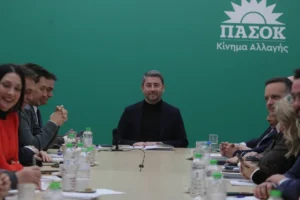Greece cannot afford to lose control of the region if it is to ensure its own security and stability, as well as that of its partners. Karamanlis’s explosive warning to Mitsotakis, Gerapetritis, and ELIAMEP. Most importantly, in a region rich in Greek islands and territories, the unity between these territories and the mainland must always be preserved.
No matter how hard some may try to find justification for Turkey’s actions, where none exists, in order to make concessions appear reasonable or fair, the reality is clear. Through its persistent claims since the 1970s, Turkey has sought to legitimise these demands, drawing both Greece and the international community into a pattern of acquiescence. It seeks to turn these demands into “backdoor” issues for negotiation. By means of provocations and threats, Turkey instills a fear of war, attempting to raise the cost of insisting on justice, not just for us but for the international community as a whole. With its ‘Blue Homeland’ doctrine, which Turkey has officially adopted, it aims to control half of the Aegean and to assert regional hegemony in the Eastern Mediterranean. This is not a bluff, nor a bargaining chip; it is a strategic programme backed by a plan. Turkey has enshrined this vision in textbooks, teaching it to future generations to prepare them for the long-term achievement of its goals. Under no circumstances should Greece, under the guise of goodwill or the desire for peace and cooperation, make concessions that will facilitate Turkey’s realisation of this vision. Every concession Turkey gains will simply be a step closer to the long-term realisation of this agenda, rather than a price paid for peace.
Let us make this clear to Turkey, and to our partners and allies alike, because there is a misunderstanding that needs addressing. Many assert that Turkey also has rights in the Aegean and the Eastern Mediterranean.
Turkey’s declared aim is to overturn the status quo established by international law and treaties, to disrupt the unity of Greek territorial space, and to impose its own imperial ambitions in the region. In simple terms, it is pursuing a policy of revisionism, aiming for a hegemonic position. If Turkey succeeds, Greece would be reduced to a subordinate, dependent state. The Turkish-Libyan Memorandum is a clear manifestation of Turkey’s intentions. It is a flagrant violation of international law – an unfounded and illegal action with no legal standing. Turkey, having no formal relations with Libya, and with no legal or geographical basis for its claims, disregarded the existence of Greek islands in the area and shared Greece’s EEZ with Libya. Despite widespread condemnation by the international community for this blatant illegality, Turkey continues to feign ignorance. But this is precisely the approach it seeks to apply in the rest of the Aegean and Eastern Mediterranean – to disregard the Greek islands and divide the maritime space as if they do not exist.
No Greek would consider making any concessions, at the expense of our own interests, in order to appease Turkey or facilitate negotiations. An agreement is not an end in itself; it must safeguard Greece’s security and national interests across the entirety of its territory. Peace and stability are not achieved by concessions. On the contrary, such compromises only serve to encourage aggression and expansionism from the other side.
Moreover, Greece must make it clear that it is determined to claim the maximum delimitation allowed under international law. In negotiations, the preparatory actions you take are crucial for maximising your gains, as are the messages you send to the other side and to the international community. Therefore, I will highlight a few key points.
We should submit the country’s maritime spatial plan to the European Union, in compliance with the relevant EU directive. We are obligated to do this, and it presents a prime opportunity to have our rights endorsed with the EU’s stamp of approval. In this context, we could activate the declaration of the EEZ based on the median line, in accordance with Law 4001/2011 and the provisions of the International Law of the Sea. This is fully aligned with international law and in no way impedes any negotiations. The Seville Charter, which accurately depicts the EEZ to which Greece is entitled, is used by the European Union, and we must make full use of it. We must proceed with closing the bays and drawing straight baselines to extend the area to which Greece is entitled.
Another vital issue: We must preserve and strengthen economic activity on every island and rocky islet. (A direct warning about the shameful Mitsotakis bill regarding rocky islets.)
Of course, there can be no talk of demilitarising islands or partial demilitarisation. These forces not only guarantee the defence of our islands but, more fundamentally, ensure deterrence. Whatever Turkey may claim, the right of every state to defend itself, as enshrined in the UN Charter and international law, both written and customary, is paramount. This is particularly true when facing a country that has invaded Cyprus, occupying 37% of its territory for 50 years, and continues to threaten Greece with war (casus belli). Turkey also lays claim to our islands, often using bellicose rhetoric, while stationing the so-called “Aegean Army” opposite our islands, with Europe’s largest landing fleet. At the same time, Greece has a responsibility to the European Union to protect the defence and integrity of the Union’s southeastern borders.
It is, of course, unthinkable to grant Turkey sovereign rights in areas west of the Greek islands in the Eastern Aegean. As Constantine Karamanlis himself told US President George Bush Sr. during his visit to Greece in July 1991, if Turkey acquires a continental shelf west of these islands, our islands will gradually fall under Turkish control, and the unity of Greek territory will be broken.
Furthermore, Turkey is persistently trying to have the Muslim minority in Thrace recognised as Turkish for ulterior motives. Now, it is slowly raising another issue—its claim to ‘homogeneity’ in the Dodecanese. The Lausanne Treaty is clear and refers specifically to the Muslim minority in Thrace, which consists of three ethnic groups: Turkish, Pomak, and Roma. Each member of these groups can identify as Turkish, Pomak, or Roma based on individual self-determination. However, one cannot dishonestly conflate treaties dealing with collective groups, like the Lausanne Treaty, with those concerning individual rights. Greece is a modern European democracy that follows a minority policy focused on the welfare of the minority. No other state, especially one responsible for nearly eradicating the Greek minority in Turkey, has any right to meddle in our internal affairs or make demands. Nor is it acceptable to link ethnic origin to irredentist ambitions.
The key priority must always be Cypriot Hellenism. Not only because it is an integral part of the nation but also because the strategic link between our two states enhances the geopolitical importance of Hellenism in the region. This is precisely what Turkey fears and aims to destroy. Let us not forget that Hellenism constitutes the southeast border of the European Union and acts as its bulwark in this critical region. Therefore, a solution to the Cyprus problem is of direct concern to us and must be reached in line with United Nations resolutions and EU law, ensuring it is functional, viable, and does not make the Cypriot state hostage to Turkey.












